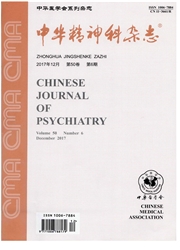

 中文摘要:
中文摘要:
目的 分析内源性大麻素mRNA在首次发病未服药抑郁症患者外周血中的表达,探讨内源性大麻素系统与抑郁发作之间的关系.方法 对符合DSM-Ⅳ中抑郁发作诊断标准的39例首次发病未服药患者(患者组)和35名健康对照者(对照组)进行WCST和Stroop色词测试,采集所有受试者空腹外周血液样本,检测大麻素受体1(cannabinoid receptor 1,CB1)和脂肪酸酰胺水解酶(fatty acid amide hydrolase,FAAH)的mRNA表达水平.并使用HAMD17评估患者的抑郁症状严重程度.结果 (1)患者组CB1-mRNA的表达水平(0.13±0.22)低于对照组(0.24±0.26),差异有统计学意义(Z=-1.965,P<0.05).CBl-mRNA的表达量与HAMD17体重因子分相关(r=0.484,P=0.001).(2)患者组FAAH-mRNA的表达水平(0.16±0.24)与对照组(0.17±0.24)比较差异无统计学意义(Z=-1.413,P>0.05);FAAH-mRNA的表达与HAMD17中认知障碍因子分相关(r=0.345,P=0.045).结论 内源性大麻素mRNA在抑郁症患者外周血中表达降低,提示内源性大麻素系统可能与抑郁发作的发病机制存在联系.
 英文摘要:
英文摘要:
Objective To study the expression of endocannabinoid mRNA in the blood of untreated patients with first-episode major depressive disorder,to explore the relationship between the endocannabinoid system and major depressive disorder.Methods Thirty-nine untreated first-episode major depressive disorder patients diagnosed with DSM-Ⅳ and 35 healthy volunteers were included and assessed with the Wisconsin Card Sorting Test and the Stroop Color Word Test.Their blood was collected in the fasting state and analyzed to test the possible differences of mRNA expression of cannabinoid receptor 1 (CB1) and fatty acid amide hydrolase (FAAH) between depressive subjects and healthy controls.The patients' severity of symptoms was assessed with HAMD17.Results (1) Compared with controls (0.24 ± 0.26),there was significantly lower levels of CB1 receptor mRNA in the blood of patients with major depressive disorder (0.13-± 0.22;Z =-1.965,P 〈 0.05);the levels of CB1 receptor mRNA exhibited a significant correlation with weight factor score of the HAMD17 (r =0.484,P =0.001).(2)There was no difference between the expression of FAAH mRNA(0.16 ± 0.24) and controls (0.17 ± 0.24;Z =-1.413,P 〉 0.05);Levels of FAAH mRNA exhibited a significant correlation with patients' cognition factor score of HAMD17 (r =0.345,P =0.045).Conclusions The lower endocannabinoid mRNA expression in the blood of patients with depression may be involved in the pathogenesis of major depression.
 同期刊论文项目
同期刊论文项目
 同项目期刊论文
同项目期刊论文
 期刊信息
期刊信息
